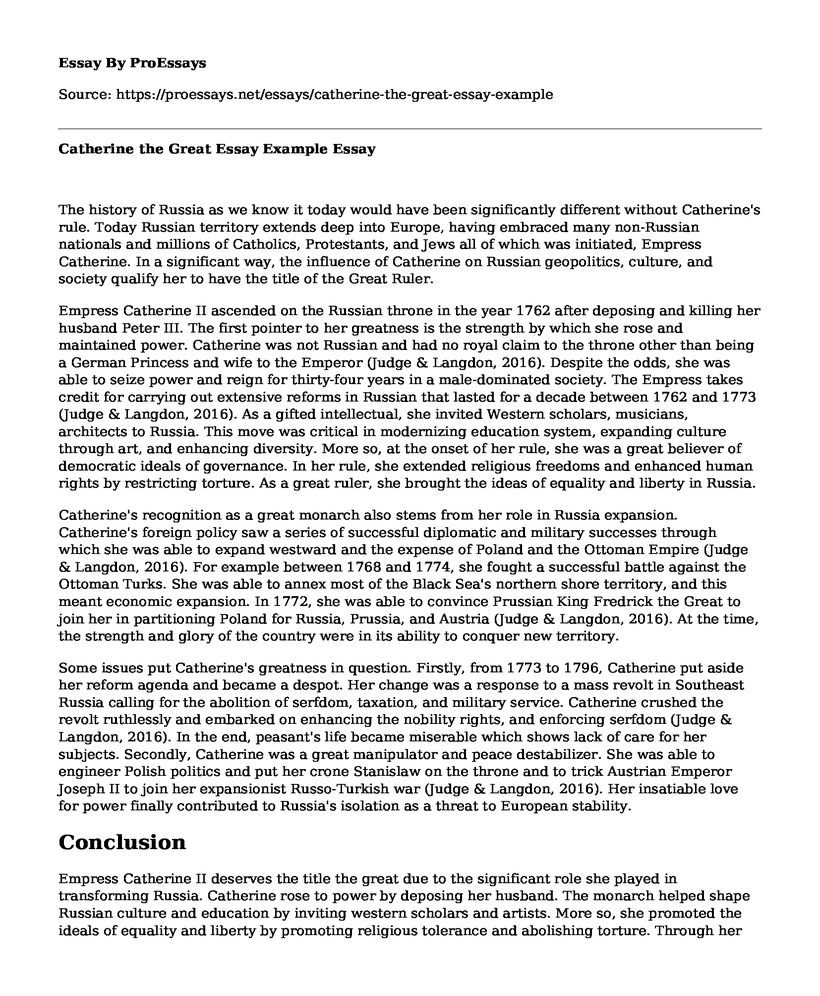The history of Russia as we know it today would have been significantly different without Catherine's rule. Today Russian territory extends deep into Europe, having embraced many non-Russian nationals and millions of Catholics, Protestants, and Jews all of which was initiated, Empress Catherine. In a significant way, the influence of Catherine on Russian geopolitics, culture, and society qualify her to have the title of the Great Ruler.
Empress Catherine II ascended on the Russian throne in the year 1762 after deposing and killing her husband Peter III. The first pointer to her greatness is the strength by which she rose and maintained power. Catherine was not Russian and had no royal claim to the throne other than being a German Princess and wife to the Emperor (Judge & Langdon, 2016). Despite the odds, she was able to seize power and reign for thirty-four years in a male-dominated society. The Empress takes credit for carrying out extensive reforms in Russian that lasted for a decade between 1762 and 1773 (Judge & Langdon, 2016). As a gifted intellectual, she invited Western scholars, musicians, architects to Russia. This move was critical in modernizing education system, expanding culture through art, and enhancing diversity. More so, at the onset of her rule, she was a great believer of democratic ideals of governance. In her rule, she extended religious freedoms and enhanced human rights by restricting torture. As a great ruler, she brought the ideas of equality and liberty in Russia.
Catherine's recognition as a great monarch also stems from her role in Russia expansion. Catherine's foreign policy saw a series of successful diplomatic and military successes through which she was able to expand westward and the expense of Poland and the Ottoman Empire (Judge & Langdon, 2016). For example between 1768 and 1774, she fought a successful battle against the Ottoman Turks. She was able to annex most of the Black Sea's northern shore territory, and this meant economic expansion. In 1772, she was able to convince Prussian King Fredrick the Great to join her in partitioning Poland for Russia, Prussia, and Austria (Judge & Langdon, 2016). At the time, the strength and glory of the country were in its ability to conquer new territory.
Some issues put Catherine's greatness in question. Firstly, from 1773 to 1796, Catherine put aside her reform agenda and became a despot. Her change was a response to a mass revolt in Southeast Russia calling for the abolition of serfdom, taxation, and military service. Catherine crushed the revolt ruthlessly and embarked on enhancing the nobility rights, and enforcing serfdom (Judge & Langdon, 2016). In the end, peasant's life became miserable which shows lack of care for her subjects. Secondly, Catherine was a great manipulator and peace destabilizer. She was able to engineer Polish politics and put her crone Stanislaw on the throne and to trick Austrian Emperor Joseph II to join her expansionist Russo-Turkish war (Judge & Langdon, 2016). Her insatiable love for power finally contributed to Russia's isolation as a threat to European stability.
Conclusion
Empress Catherine II deserves the title the great due to the significant role she played in transforming Russia. Catherine rose to power by deposing her husband. The monarch helped shape Russian culture and education by inviting western scholars and artists. More so, she promoted the ideals of equality and liberty by promoting religious tolerance and abolishing torture. Through her military campaigns, Russia was able to extend its territory into Poland and the Ottoman Empire. Catherine discredited her rule by halting her reform agenda, enforcing serfdom, manipulating fellow leaders, and engaging her country in meaningless wars. The Empress influence continues to influence Russia's politics, economy, and culture.
References
Judge, E. H., & Langdon, J. W. (2016). Connections: A world history (Vol. 3). New York, NY: Pearson.
Cite this page
Catherine the Great Essay Example. (2022, Jun 17). Retrieved from https://proessays.net/essays/catherine-the-great-essay-example
If you are the original author of this essay and no longer wish to have it published on the ProEssays website, please click below to request its removal:
- Essay Sample on African History
- Fidel Alejandro Castro Biographical Essay
- Rhetorical Analysis of William Wilberforce's Abolition Speech
- Essay Sample on American Civil War: Causes & Consequences
- Essay Example on Cold War: US-USSR Power Tension After WWII
- WWII: The Global War of 1939-1945 - Essay Sample
- Essay Sample on British Colonization of the Americas: Challenges and Success







